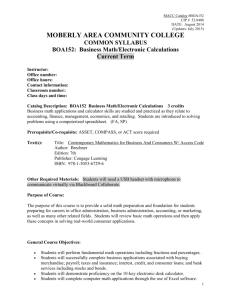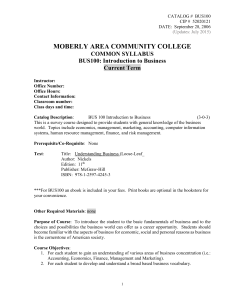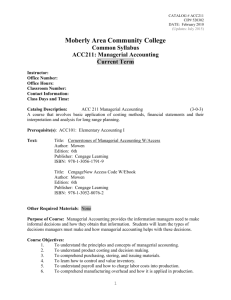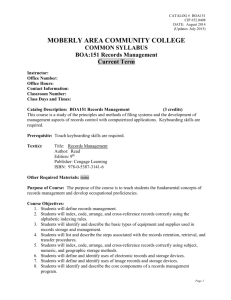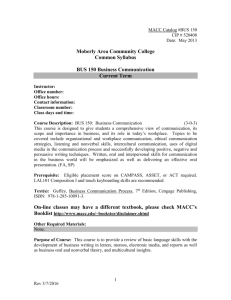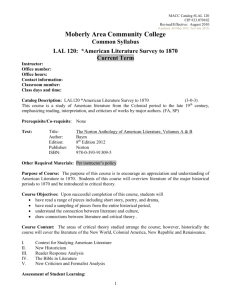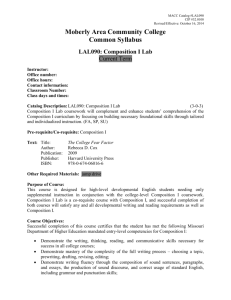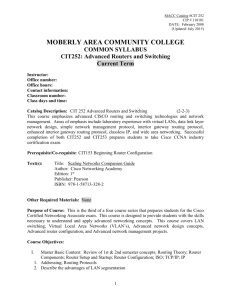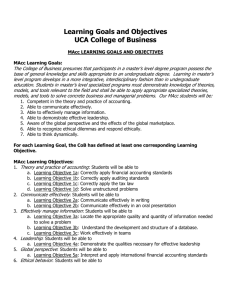BOA 181 Legal Terminology - Moberly Area Community College
advertisement
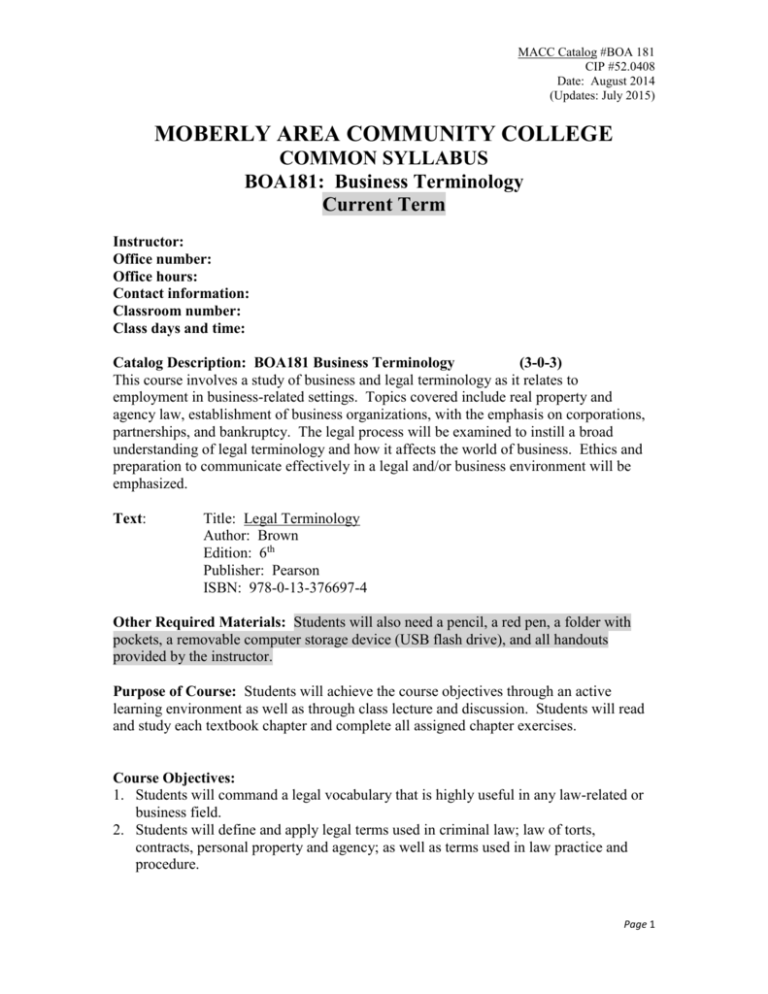
MACC Catalog #BOA 181 CIP #52.0408 Date: August 2014 (Updates: July 2015) MOBERLY AREA COMMUNITY COLLEGE COMMON SYLLABUS BOA181: Business Terminology Current Term Instructor: Office number: Office hours: Contact information: Classroom number: Class days and time: Catalog Description: BOA181 Business Terminology (3-0-3) This course involves a study of business and legal terminology as it relates to employment in business-related settings. Topics covered include real property and agency law, establishment of business organizations, with the emphasis on corporations, partnerships, and bankruptcy. The legal process will be examined to instill a broad understanding of legal terminology and how it affects the world of business. Ethics and preparation to communicate effectively in a legal and/or business environment will be emphasized. Text: Title: Legal Terminology Author: Brown Edition: 6th Publisher: Pearson ISBN: 978-0-13-376697-4 Other Required Materials: Students will also need a pencil, a red pen, a folder with pockets, a removable computer storage device (USB flash drive), and all handouts provided by the instructor. Purpose of Course: Students will achieve the course objectives through an active learning environment as well as through class lecture and discussion. Students will read and study each textbook chapter and complete all assigned chapter exercises. Course Objectives: 1. Students will command a legal vocabulary that is highly useful in any law-related or business field. 2. Students will define and apply legal terms used in criminal law; law of torts, contracts, personal property and agency; as well as terms used in law practice and procedure. Page 1 MACC Catalog #BOA 181 CIP #52.0408 Date: August 2014 (Updates: July 2015) 3. Students will define and apply legal terms used in law of wills and estates, real property, and negotiable instruments. 4. Students will define and apply legal terms used in family law, business organization and bankruptcy. Course Content: Part One - Terms Used in Practice and Procedure Chapter 1: Court Systems and Jurisdiction Chapter 2: Criminal Trial Procedure Chapter 3: Civil Trial Procedure Chapter 4: Defensive Pleadings in Civil Trials Chapter 5: Methods of Discovery Chapter 6: Pretrial Hearing and Jury Trial Chapter 7: Steps in a Trial Chapter 8: Legal Ethics Part Two - Terms Used in Constitutional and Criminal Law Chapter 9: Constitutional Law Chapter 10: Crimes, Accomplices, and Defenses Chapter 11: Crimes Against Property Chapter 12: Crimes Against the Person and Human Habitation Chapter 13: Homicide Chapter 14: Crimes Against Morality and Drug Abuse Part Three - Terms Used in Law of Torts Chapter 15: Torts and Tortfeasors Chapter 16: Intentional Torts Chapter 17: Negligence and Product Liability Part Four - Terms Used in Law of Contracts Chapter 18: Formation of Contracts Chapter 19: Contract Requirements Chapter 20: Third Parties and Discharge of Contracts Part Five – Terms Used in Personal Property and Agency Chapter 21: Personal Property and Bailments Chapter 22: Intellectual Property Chapter 23: Law of Agency Part Six - Terms Used in Law of Wills and Estates Chapter 24: Wills, Testaments, and Advance Directives Chapter 25: Revocation, Lapses, and Ademption Chapter 26: Principal Clauses in a Will Chapter 27: Disinheritance and Intestacy Chapter 28: Personal Representative of the Estate Page 2 MACC Catalog #BOA 181 CIP #52.0408 Date: August 2014 (Updates: July 2015) Chapter 29: Settling an Estate Chapter 30: Trusts Part Seven – Terms Used in Law of Real Property Chapter 31: Estates in Real Property Chapter 32: Multi-Ownership of Real Property Chapter 33: Acquiring Title to Real Property Chapter 34: Deeds Chapter 35: Mortgages Chapter 36: Landlord and Tenant Part Eight – Terms Used in Family Law Chapter 37: Marriage, Divorce, and Dissolution of Marriage Chapter 38: Divorce Procedure Part Nine – Terms Used in Business Organization and Bankruptcy Chapter 39: Business Organization Chapter 40: The Law of Bankruptcy Assessment of Student Learning Grading: Grades are determined on the basis of examination scores and written homework assignments and class participation. Counseling with the student when the need arises to evaluate his/her efforts and/or weaknesses also plays a part in grading. The grading scale is: A = 90%, B = 80%, C = 70%, D = 60%. Description of Major Assignment(s)/Project(s): none Program Assessment of Student Learning: The Business Office Administration faculty continually strive to meet the needs of their students through program improvements. These improvements are a result of program assessments and the consultation and advisement of the BOA Advisory Committee. In addition to the course assessments outlined in this syllabus, the objectives achieved in this course will also be an integral part of the Business Office Administration program assessment. Students will be assessed on the mastery of course concepts and essential skills attained in this course during the Business Office Administration Capstone course. Statement to Connect Course with General Education Outcomes or Technical Education Program Objectives: In compliance with MACC’s Business Office Administration Program Assessment Plan, the student who successfully completes this course will be able to meet the following Program Objectives: Page 3 MACC Catalog #BOA 181 CIP #52.0408 Date: August 2014 (Updates: July 2015) 14. Develop an understanding of common legal terms used by legal assistants and legal secretaries. (Legal/Executive emphasis) 14.1 Command a legal vocabulary that is highly useful in any law-related or business field. 14.2 Define legal terms used in criminal law; law of torts, contracts, personal property and agency; as well as terms used in law practice and procedure. 14.3 Define legal terms used in law of wills and estates, real property, and negotiable instruments. 14.4 Define legal terms used in family law, business organization, and bankruptcy. Instructor Policies: Attendance: Any student who misses two consecutive weeks of class during a regular sixteen-week semester or the equivalent proportion of class time during a shorter session will be dropped from the class by the instructor unless acceptable justification is supplied. Additionally, any student who misses more than one-fourth of the entire number of in-seat class meetings in a regular 16-week semester or the equivalent proportion of class time during a shorter session, may be dropped from that class by the instructor if, in the opinion of the instructor, the student does not have reasonable opportunity to succeed in the class. Student attendance must be defined in a different manner for online, hybrid, and virtual courses. Student attendance in these courses is defined as active participation in the course. Online, hybrid, and virtual courses will, at a minimum, have weekly mechanisms for student participation, such as any or all of the following methods: a. Completion of quizzes or exams b. Submission of assignments c. Participation in threaded discussions d. Communication with the instructor A student who does not participate in an online, hybrid, or virtual course for two consecutive weeks will be dropped by the instructor unless acceptable justification is supplied. Tardiness: per instructor’s policy Make-up and late work: per instructor’s policy Extra-Credit: per instructor’s policy Schedule of Student Assignment and Activities: (per instructor) Page 4 MACC Catalog #BOA 181 CIP #52.0408 Date: August 2014 (Updates: July 2015) College Policies/Procedures: Americans with Disabilities Act Students who have disabilities that qualify under the Americans with Disabilities Act may register for assistance through the Office of Access and ADA Services. Students are invited to contact the Access Office to confidentially discuss disability information, academic accommodations, appropriate documentation and procedures. For more information, please call either the Moberly office at (660) 263-4100 x 11240 or the Columbia office at (573) 234-1067 x 12120, or visit our web page at http://www.macc.edu/index.php/services/access-office. Title IX Statement MACC maintains a strict policy prohibiting sexual misconduct in any form, including sexual harassment, sexual discrimination, and sexual violence. All MACC employees, including faculty members, are considered mandated reporters of sexual misconduct and as such are expected to contact the Title IX Coordinator when they become aware, in conversation or in writing, of an incident of sexual misconduct. For more information on this policy or to learn about support resources, please see http://www.macc.edu/sexualmisconduct-policy or contact Dr. Jackie Fischer, MACC’s Title IX Coordinator, at 660263-4110, ext. 11236 or jackief@macc.edu. Parental Responsibility for Children Students who are parents have the responsibility to arrange for suitable care of their children while they attend class. Students should not bring children to class: nor should children be left unattended anywhere on campus. Procedures to protect the safety and welfare of unattended children will be handled by the College. (Student Handbook) Academic Dishonesty MACC board policy is as follows: “Academic dishonesty by students damages institutional credibility and unfairly jeopardizes honest students; therefore, it will not be tolerated in any form.” Forms of academic dishonesty include but are not limited to the following: violations of copyright law, plagiarism, fabrication, cheating, collusion, and other academic misconduct. Incidents of dishonesty regarding assignments, examinations, classroom/laboratory activities, and/or the submission of misleading or false information to the College will be treated seriously. The procedure for handling academic dishonesty is outlined in the Student Handbook (Policy Handbook M.010). In cases of alleged academic dishonesty, the burden of proof is on the student, not on the instructor. Page 5
